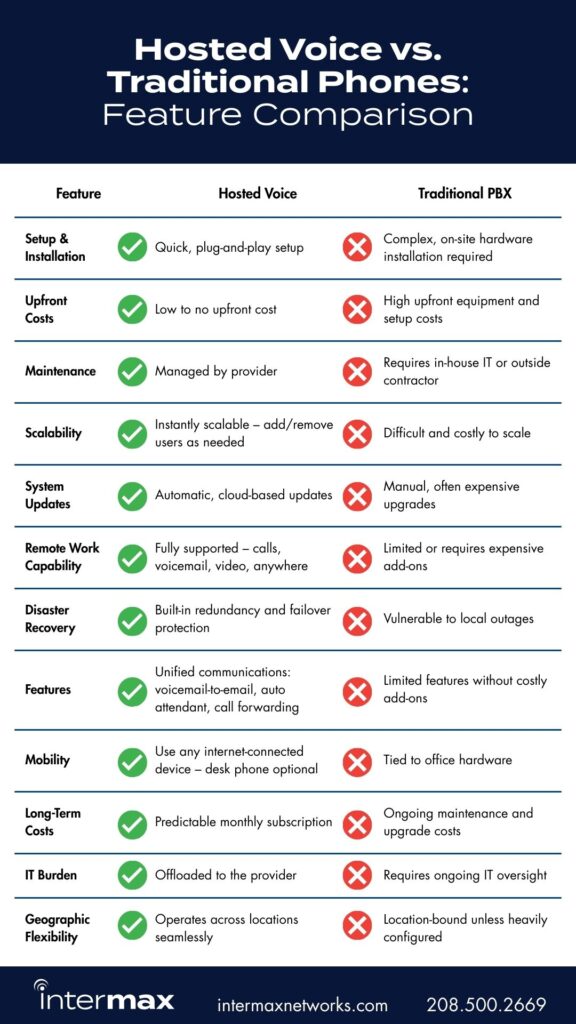
Hosted Voice vs. Traditional PBX Phone Systems: Feature Comparison
The business landscape is rapidly evolving, and choosing the right phone system is critical to your organization’s flexibility, efficiency, and bottom line. Two primary options dominate the market are traditional on-premises PBX systems and modern Hosted Voice (VoIP) solutions. In this article, we’ll explain how each system works, compare their key features side by side, and explore which solution is best suited for small to medium-sized businesses, and both urban and rural locals, even places with unique geography and challenging weather, like North Idaho.
What is Traditional PBX?
Traditional PBX (Private Branch Exchange) is an on-premise phone system that uses physical hardware, such as a server cabinet, switches, and landlines, to manage and route internal and external phone calls within a business.
Here’s a breakdown of how it works and what it includes:
- Hardware-Based: A traditional PBX is typically installed in a company’s office and connects to the Public Switched Telephone Network (PSTN).
- Wired Infrastructure: Digital and analog phones are hardwired into the PBX system, and adding new users often requires installing additional lines.
- Call Routing: The PBX manages features like call forwarding, voicemail, internal extensions, and conference calling.
- Manual Maintenance: Requires on-site technical staff or a third-party technician for upgrades, repairs, and reconfiguration.
Limitations:
- High upfront and maintenance costs.
- Limited scalability.
- Not ideal for remote work or multi-location support.
Use Case:
Traditional PBX systems were standard in offices before internet-based alternatives became widespread. Most modern businesses are transitioning away from them due to their limitations.
What is Hosted Voice?
Hosted Voice, also known as VoIP (Voice over Internet Protocol) or UCaaS (Unified Communications as a Service), is a cloud-based phone system where all call routing, management, and maintenance are handled off-site by a service provider. Instead of using traditional phone lines and on-site equipment, Hosted Voice systems use your internet connection to make and receive calls.
Key Characteristics:
- Cloud-Based: The phone system operates on servers managed by a provider, eliminating the need for bulky on-site hardware.
- Internet-Powered: Calls are transmitted over the internet, rather than through copper phone lines.
- Subscription Model: Businesses typically pay a monthly fee per user, which includes maintenance, support, and upgrades.
- Rich Features: Includes advanced capabilities like voicemail-to-email, call forwarding, video conferencing, auto attendants, and more.
- Remote-Friendly: Users can make and receive calls from anywhere with a good internet connection. Ideal for hybrid or remote teams.
Benefits:
- Lower upfront costs.
- Quick setup and easy scalability.
- Minimal IT involvement. Maintenance and updates are handled by the provider.
- High flexibility and geographic freedom.
Use Case:
Hosted Voice is an excellent solution for small to medium-sized businesses looking for a modern, cost-effective, and reliable communication system that supports growth, mobility, and remote work.

Feature Comparison
Setup and Installation
- Traditional PBX: Requires physical hardware installation on-site, often involving complex wiring and configuration. Setup can take days or even weeks.
- Hosted Voice: Setup is virtual, quick, and often plug-and-play with compatible devices. No major infrastructure changes are needed.
Upfront Costs
- Traditional PBX: High capital expenditure for hardware, installation, and licensing.
- Hosted Voice: Lower upfront investment. Costs are subscription-based, making it more budget-friendly for most businesses.
Maintenance
- Traditional PBX: Requires regular, on-site maintenance by specialized technicians, which can be costly and time-consuming.
- Hosted Voice: Maintenance is handled by the service provider remotely, reducing downtime and eliminating on-site tech visits.
Scalability
- Traditional PBX: Limited by hardware capacity. Adding new lines or users often requires purchasing additional hardware.
- Hosted Voice: Easily scalable. Add or remove users through an online portal without needing new equipment.
System Updates
- Traditional PBX: Manual updates are required, often performed by a technician.
- Hosted Voice: Updates are automatic and managed by the provider, ensuring the system is always up to date.
Remote Work Capability
- Traditional PBX: Limited support for remote work. Extensions typically only work within the office.
- Hosted Voice: Built for remote work. Employees can use the system from anywhere with an internet connection.
Disaster Recovery
- Traditional PBX: Vulnerable to physical disruptions. If the system or building goes down, so does your communication.
- Hosted Voice: Cloud-based systems provide robust disaster recovery. Calls can be rerouted instantly, and data is backed up automatically.
Features
- Traditional PBX: Basic calling features like voicemail, call transfer, and conference calling.
- Hosted Voice: Advanced features like call forwarding, voicemail-to-email, mobile apps, video conferencing, auto attendants, and analytics.
Mobility
- Traditional PBX: Limited to in-office hardware.
- Hosted Voice: Supports mobile and desktop apps, allowing employees to work from anywhere using a smartphone, tablet, or computer.
Long-Term Costs
- Traditional PBX: Ongoing expenses for maintenance, upgrades, and tech support add up over time.
- Hosted Voice: Predictable monthly costs with no surprise fees. Lower TCO (Total Cost of Ownership) over time.
IT Burden
- Traditional PBX: Requires internal IT staff or third-party contractors to manage.
- Hosted Voice: Managed entirely by the provider, freeing up internal resources.
Geographic Flexibility
- Traditional PBX: Bound to physical locations. Expansion to new offices requires new systems or a complicated configuration.
- Hosted Voice: Ideal for businesses with multiple locations. Easily supports distributed teams under one unified system.

Why Hosted Voice Is Better for SMBs
For small and medium-sized businesses, Hosted Voice offers a powerful, affordable alternative to outdated PBX systems. With minimal upfront costs, simplified maintenance, and enterprise-level features, Hosted Voice levels the playing field, giving SMBs access to the tools and flexibility once reserved for large corporations. It’s a future-ready solution that grows with your business.
For most small and mid-sized businesses (SMBs), Hosted Voice is the better choice compared to Traditional PBX. Here’s why:
Lower Upfront Costs
SMBs often work within tight budgets. Hosted Voice eliminates the need for expensive hardware and setup costs, replacing them with predictable monthly fees.
Scalability
As your business grows, you can easily add or remove users without needing to purchase more equipment, perfect for fast-moving or seasonal businesses.
Remote and Mobile Work
Hosted Voice supports a flexible, mobile workforce. Team members can take calls from their laptops or smartphones anywhere there’s internet—ideal for hybrid or remote operations.
Minimal IT Burden
SMBs rarely have large IT teams. With Hosted Voice, the provider handles updates, troubleshooting, and system maintenance, freeing your team to focus on the business.
Advanced Features
You get enterprise-level features like auto attendants, call recording, voicemail-to-email, and analytics, without the enterprise price tag.
Resilience and Reliability
Hosted Voice offers strong disaster recovery. In case of outages or local emergencies, calls can be rerouted, and the system continues to function remotely.
Why Hosted Voice Works for Rural and Urban Businesses
Businesses in both rural and urban communities across the U.S. can benefit from the flexibility and reliability of Hosted Voice. Remote and hybrid work are more common than ever, so it’s essential to have communication tools that keep your team connected, no matter where they are. Managed voice services reduce reliance on physical infrastructure and provide a dependable, modern way to stay in touch from any location. As a company based in North Idaho, we understand the unique challenges rural businesses face where rugged terrain and unpredictable weather are part of daily life. Hosted Voice offers a resilient, modern solution designed to keep teams connected, whether you’re in a small town, a remote area, or a growing city.
Supports Remote & Rural Work
Hosted Voice works anywhere with reliable internet, making it an ideal solution for businesses with employees who work from home, travel frequently, or are spread across multiple locations. Ensuring everyone stays in sync, whether you’re running a main office in a city or managing teams in rural communities.
Weather-Resilient
Heavy snowfall, windstorms, and other natural elements can disrupt on-site phone systems. Hosted Voice is cloud-based, meaning your communications keep running, even if your office loses power or access.
Lower Maintenance, Less Travel
Traditional PBX phone systems often require technicians to drive out for installation or repairs, which is especially inconvenient in remote areas or bad weather. Hosted Voice is maintained remotely, minimizing the need for on-site visits.
Geographic Flexibility
For businesses that operate across county lines, states, or even time zones, Hosted Voice provides a unified communication system. Your entire team can operate as one connected office, no matter where they’re located.
Scalable & Cost-Effective
Hosted Voice is a smart, budget-friendly solution for growing businesses. Whether you’re a small retail shop, a multi-location service provider, or a remote-first team, you can scale your communication tools as you grow without the hefty price tag of traditional systems.
Conclusion: Hosted Voice vs. Traditional PBX Phones
When comparing Hosted Voice and Traditional PBX systems, the advantages of Hosted Voice are clear. It offers faster setup, lower upfront costs, minimal maintenance, and far greater flexibility for today’s work environments. Features like automatic updates, disaster recovery, and easy scalability make it a future-proof choice, especially for businesses looking to grow or adapt quickly.
Hosted Voice is typically the smarter, more strategic investment for small and mid-sized businesses. It offers greater flexibility, advanced features, and lower upfront costs, making it an ideal solution for companies that value easy management, remote work capabilities, multi-location support, and long-term scalability.
If your business operates in areas with unique geography, challenging weather, or a growing need for remote connectivity, Hosted Voice is a smart, future-ready solution. It offers the flexibility, reliability, and low maintenance that modern teams need, especially in the beautifully rugged and remote parts of the country. With roots in North Idaho, we understand these challenges firsthand, and we’re here to help businesses across the U.S. stay connected, no matter where they call home.
Find Connection with Intermax Networks
Locally owned and operated since 2001, we’re proud to offer high-speed wireless internet, fiber, voice services, and more to thousands of residential and commercial customers. Headquartered in Coeur d’Alene with offices in Spokane, Seattle, Sandpoint, and St. Maries, Intermax is the locals’ choice for reliable service in hard-to-reach places.
Our friendly support team is here to answer any questions you may have. Visit Intermax Networks, or call us at (208) 568-7979 today!


